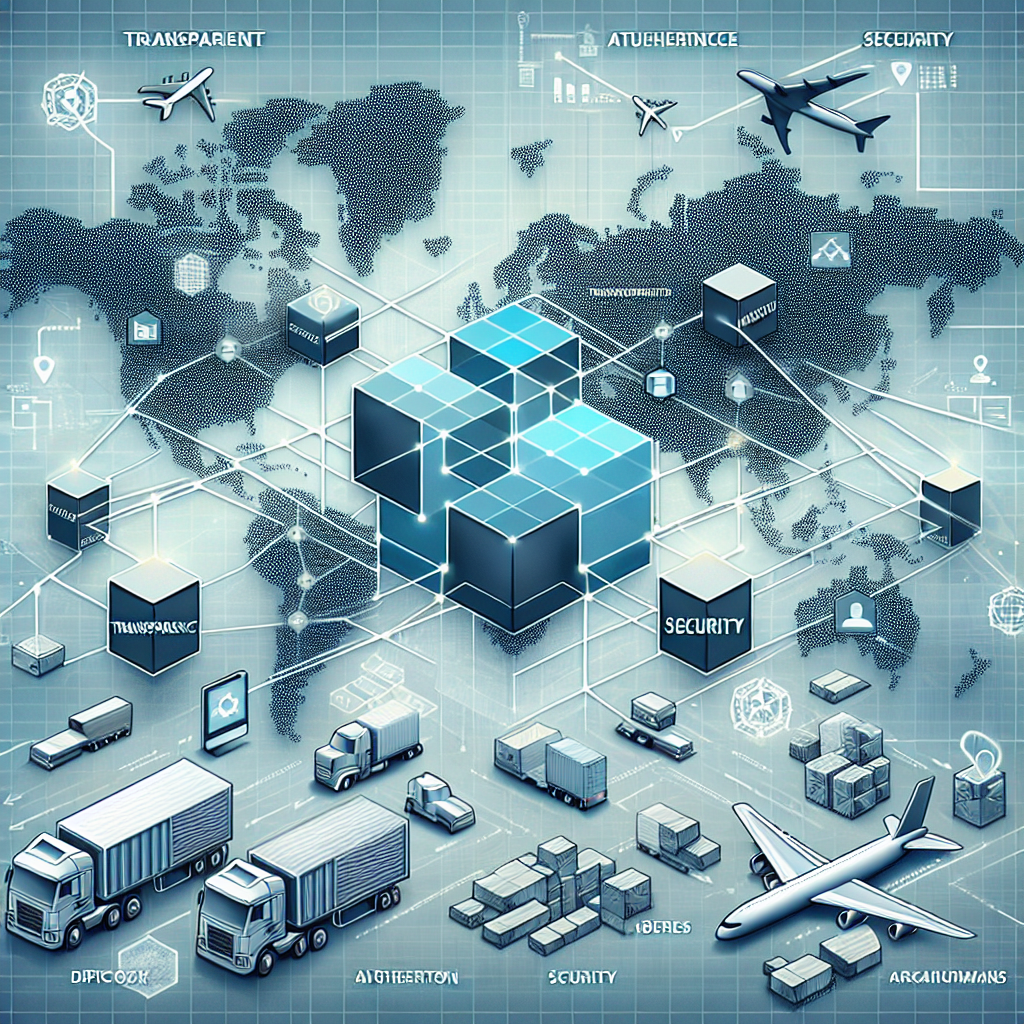-
Table of Contents
“Unlock Efficiency and Transparency: Harnessing Blockchain for Supply Chain Excellence”
Introduction

Blockchain technology, originally developed as the underlying architecture for cryptocurrencies like Bitcoin, has rapidly evolved to offer transformative potential across various industries. One of the most promising applications of blockchain is in supply chain management, where it addresses critical challenges such as transparency, traceability, and efficiency. By leveraging a decentralized and immutable ledger, blockchain enables real-time tracking of goods, reduces fraud, and enhances trust among stakeholders. This introduction explores the multifaceted benefits of integrating blockchain into supply chain management, highlighting how it can revolutionize traditional practices and drive significant improvements in operational performance.
Enhancing Transparency and Traceability in Supply Chains with Blockchain
Blockchain technology, often associated with cryptocurrencies like Bitcoin, is making significant strides in transforming various industries, including supply chain management. One of the most compelling advantages of blockchain in this context is its ability to enhance transparency and traceability, which are critical components for efficient and trustworthy supply chains. As businesses and consumers alike demand more information about the origins and journey of products, blockchain offers a robust solution to meet these needs.
To begin with, blockchain’s decentralized nature ensures that no single entity has control over the entire supply chain data. This decentralization is crucial for transparency, as it allows all stakeholders, from manufacturers to end consumers, to access the same information. Each transaction or movement of goods is recorded in a block, which is then added to a chain of previous transactions. This chain is immutable, meaning once a block is added, it cannot be altered or deleted. Consequently, this immutability guarantees that the data is reliable and tamper-proof, fostering trust among all parties involved.
Moreover, the traceability offered by blockchain is unparalleled. In traditional supply chains, tracking the journey of a product from its origin to the final consumer can be a cumbersome and error-prone process. However, with blockchain, every step of the product’s journey is recorded in real-time. For instance, a consumer purchasing a piece of chocolate can trace the cocoa beans back to the specific farm where they were harvested. This level of detail is not only fascinating but also essential for verifying claims such as organic or fair-trade certifications. It empowers consumers to make informed choices and holds companies accountable for their sourcing practices.
In addition to benefiting consumers, enhanced transparency and traceability can significantly improve operational efficiency for businesses. By having a clear and accurate record of each transaction, companies can quickly identify and address any issues that arise. For example, in the event of a product recall, blockchain allows for rapid identification of the affected batches, minimizing the scope of the recall and reducing potential losses. This swift response is particularly vital in industries like food and pharmaceuticals, where safety and compliance are paramount.
Furthermore, blockchain can help combat fraud and counterfeiting, which are persistent challenges in global supply chains. By providing a verifiable and unchangeable record of a product’s history, blockchain makes it exceedingly difficult for counterfeit goods to enter the supply chain undetected. This protection is invaluable for industries dealing with high-value or sensitive products, such as luxury goods, electronics, and pharmaceuticals. It ensures that consumers receive genuine products and that brands maintain their reputation and integrity.
Another significant advantage of blockchain in supply chain management is its potential to streamline administrative processes. Traditional supply chains often involve extensive paperwork and manual record-keeping, which are not only time-consuming but also prone to human error. Blockchain automates these processes, reducing the need for intermediaries and paperwork. This automation leads to faster transactions, lower costs, and fewer errors, ultimately enhancing the overall efficiency of the supply chain.
In conclusion, the integration of blockchain technology into supply chain management offers numerous benefits, particularly in enhancing transparency and traceability. By providing a decentralized, immutable, and real-time record of transactions, blockchain fosters trust, improves operational efficiency, combats fraud, and streamlines administrative processes. As businesses continue to explore and adopt this innovative technology, the future of supply chain management looks increasingly transparent, efficient, and reliable.
Reducing Costs and Increasing Efficiency through Blockchain Integration
Blockchain technology, often associated with cryptocurrencies like Bitcoin, is making significant inroads into various industries, including supply chain management. By integrating blockchain into supply chains, companies are discovering new ways to reduce costs and increase efficiency. This innovative technology offers a transparent, secure, and decentralized method of recording transactions, which can revolutionize the way businesses operate.
One of the primary benefits of blockchain in supply chain management is its ability to enhance transparency. Traditional supply chains often suffer from a lack of visibility, making it difficult to track products from their origin to their final destination. Blockchain addresses this issue by providing a decentralized ledger that records every transaction in real-time. This means that all parties involved in the supply chain, from manufacturers to retailers, can access the same information simultaneously. Consequently, this transparency helps to build trust among stakeholders and reduces the risk of fraud and counterfeiting.
In addition to transparency, blockchain technology significantly improves traceability. In the event of a product recall, for instance, companies can quickly identify the affected items and their origins. This rapid response is crucial in minimizing the impact of recalls on both consumers and businesses. Moreover, enhanced traceability ensures that companies can verify the authenticity of their products, which is particularly important in industries such as pharmaceuticals and luxury goods.
Another advantage of blockchain integration is the reduction of administrative costs. Traditional supply chains often involve a plethora of paperwork and manual processes, which can be both time-consuming and prone to errors. Blockchain automates many of these processes, reducing the need for intermediaries and minimizing the risk of human error. Smart contracts, a feature of blockchain technology, further streamline operations by automatically executing agreements when predefined conditions are met. This automation not only speeds up transactions but also reduces the costs associated with manual processing.
Furthermore, blockchain technology enhances security within the supply chain. Each transaction recorded on the blockchain is encrypted and linked to the previous transaction, creating an immutable chain of data. This makes it extremely difficult for malicious actors to alter or tamper with the information. As a result, companies can be more confident in the integrity of their supply chain data, which is essential for maintaining compliance with industry regulations and standards.
The integration of blockchain also fosters better collaboration among supply chain partners. By providing a single source of truth, blockchain eliminates the discrepancies that often arise from using disparate systems. This unified approach ensures that all parties have access to accurate and up-to-date information, facilitating smoother communication and coordination. Improved collaboration can lead to more efficient decision-making and ultimately, a more responsive and agile supply chain.
Moreover, blockchain technology can lead to significant cost savings by optimizing inventory management. With real-time visibility into inventory levels and demand patterns, companies can better forecast their needs and reduce excess stock. This not only lowers storage costs but also minimizes the risk of stockouts and overproduction. Additionally, the enhanced accuracy of blockchain data helps companies to negotiate better terms with suppliers and reduce procurement costs.
In conclusion, the integration of blockchain technology into supply chain management offers numerous benefits, including increased transparency, improved traceability, reduced administrative costs, enhanced security, better collaboration, and optimized inventory management. As more companies recognize these advantages, the adoption of blockchain in supply chains is likely to accelerate, paving the way for a more efficient and cost-effective future.
Strengthening Security and Reducing Fraud in Supply Chain Management with Blockchain
Blockchain technology, often associated with cryptocurrencies like Bitcoin, is making significant inroads into various industries, including supply chain management. This innovative technology offers a myriad of benefits, particularly in strengthening security and reducing fraud. As businesses increasingly seek ways to enhance transparency and efficiency, blockchain emerges as a powerful tool to address these challenges.
One of the primary advantages of blockchain in supply chain management is its ability to provide an immutable and transparent ledger of transactions. Each transaction is recorded in a block and linked to the previous one, creating a chain of records that is virtually tamper-proof. This transparency ensures that all parties involved in the supply chain, from manufacturers to retailers, have access to the same information. Consequently, it becomes significantly harder for any single entity to manipulate data for fraudulent purposes.
Moreover, blockchain’s decentralized nature means that no single party has control over the entire chain. This decentralization is crucial in preventing fraud, as it eliminates the possibility of a single point of failure. In traditional supply chain systems, a central authority often manages the data, making it a prime target for cyber-attacks. Blockchain, on the other hand, distributes the data across a network of computers, making it exceedingly difficult for hackers to alter the information without being detected.
In addition to enhancing security, blockchain also improves traceability within the supply chain. Every product can be tracked from its origin to its final destination, with each step recorded on the blockchain. This level of traceability is particularly beneficial in industries such as food and pharmaceuticals, where the authenticity and safety of products are paramount. For instance, in the event of a foodborne illness outbreak, blockchain can help trace the contaminated product back to its source in a matter of seconds, enabling quicker recalls and reducing the risk to consumers.
Furthermore, blockchain can streamline the verification process for certifications and compliance. Many products require various certifications to ensure they meet industry standards and regulations. Traditionally, verifying these certifications can be a time-consuming and cumbersome process, often involving multiple intermediaries. Blockchain simplifies this by providing a single, verifiable source of truth. Certifications can be recorded on the blockchain, allowing all parties to verify their authenticity quickly and efficiently.
Another significant benefit of blockchain in supply chain management is its potential to reduce costs. By eliminating the need for intermediaries and reducing the risk of fraud, businesses can save substantial amounts of money. Additionally, the increased efficiency and transparency can lead to faster transactions and reduced administrative costs. For example, smart contracts—self-executing contracts with the terms of the agreement directly written into code—can automate various processes, such as payments and order fulfillment, further reducing the need for manual intervention.
While the benefits of blockchain in supply chain management are clear, it is essential to acknowledge the challenges that come with its implementation. Integrating blockchain into existing systems can be complex and requires significant investment in technology and training. However, as more businesses recognize the potential of blockchain, the technology is likely to become more accessible and easier to implement.
In conclusion, blockchain technology offers a robust solution for strengthening security and reducing fraud in supply chain management. Its ability to provide an immutable, transparent, and decentralized ledger of transactions enhances traceability, streamlines verification processes, and reduces costs. As the technology continues to evolve, it holds the promise of transforming supply chain management, making it more secure, efficient, and transparent for all parties involved.
Conclusion
In conclusion, the integration of blockchain technology into supply chain management offers numerous benefits, including enhanced transparency, improved traceability, increased efficiency, and reduced fraud. By providing a decentralized and immutable ledger, blockchain ensures that all participants in the supply chain have access to accurate and real-time information, which can lead to better decision-making and trust among stakeholders. Additionally, the automation of processes through smart contracts can streamline operations and reduce administrative costs. Overall, blockchain has the potential to revolutionize supply chain management by making it more secure, efficient, and transparent.





